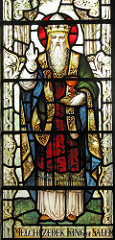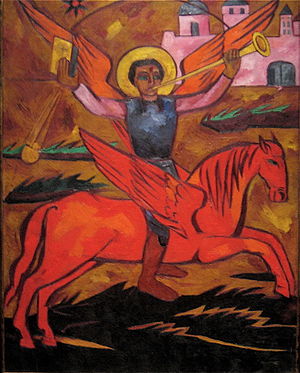
Continuing from my earlier post, Divine human-like figures in Hellenistic Judaism, based on notes from Alan F. Segal’s Two Powers in Heaven. Segal discusses several divine mediators and archangels that once formed part of the kaleidoscope of Jewish sectarian belief systems. Some Jews even believed there were two Adams in Eden at creation. Segal wrote the following in response to Paul’s linking of a similar Adam idea with the Messiah:
This leads one to suspect that Christianity was the first to synthesize the various divine agents at creation by identifying all of them with the Christian messiah. (p. 190)
Another divine mediator of certain early (intertestamental, including first century) Jews was Melchizedek. The New Testament canon includes a book declaring Jesus Christ to be a Melchizedek priest.
I outline here Segal’s account of some of the details of this pre-Christian Melchizedek belief, with additional quotations from the Qumran (Dead Sea Scrolls) literature.
Melchizedek, the archangel, may be identified in Qumran texts with The Prince of Light, the Angel of His Truth, the Spirit of His Truth, and with the archangel Michael.
The return of Melchizedek brings about the end-time judgement of God and the salvation of Zion.
So the parallels with the Christian teaching about Jesus Christ extend beyond what we read in the NT’s Epistle to the Hebrews.
1QS 3:20
He has created man to govern the world, and has appointed for him two spirits in which to walk until the time of His visitation: the spirits of truth and injustice. Those born of truth spring from a fountain of light, but those born of injustice spring from a source of darkness. All the children of righteousness are ruled by the Prince of Light and walk in the ways of light . . .
CD 5:18
For in ancient times Moses and Aaron arose by the hand of the Prince of Lights. . . .
11Q (Melch)
And it will be proclaimed at the end of days concerning the captives . . . He will assign them to the Sons of Heaven and to the inheritance of Melchizedek; for He will cast their lot amid the portions of Melchizedek, who will return them there and will proclaim to them liberty, forgiving them the wrong-doings of all their iniquities.
And this will occur in the first week of the Jubilee that follows the nine Jubilees. And the Day of Atonement is the end of the tenth Jubilee, when all the Sons of Light and the men of the lot of Melchizedek will be atoned for. . . . For this is the moment of the Year of Grace for Melchizedek. And he will, by his strength, judge the holy ones of God, executing judgement as it is written concerning him in the Songs of David, who said, ELOHIM has taken his place in the divine council, in the midst of the gods he holds judgement (Psalm 82:1) . . . . And Melchizedek will avenge the vengeance of the judgements of God . . . and he will drag them from the hand of Belial and from the hand of all the spirits of his lot. . . . And this is the day of Peace/Salvation concerning which God spoke through Isaiah the prophet . . . . And your ELOHIM is Melchizedek, who will save them from the hand of Belial.
Segal points to another possible translation of the above which equates the name of Elohim with Melchizedek.
for that is the time of the acceptable year of Melchizedek. . . God’s holy ones to the reign of judgement, as it is written concerning him the hymns of David who says: “The heavenly one (Elohim) stands in the congregation of God (El); among the heavenly ones (Elohim) he judges . . .
Melchizedek is also identified with Michael:
1QM 17:8
This is the day appointed by Him for the defeat and overthrow of the Prince of the kingdom of wickedness, and He will send eternal succour to the company of His redeemed by the might of the princely Angel of the kingdom of Michael. With everlasting light He will enlighten with joy the children of Israel; peace and blessing shall be with the company of God. He will raise up the kingdom of Michael in the midst of the gods, and the realm of Israel in the midst of all flesh . . .
How can any study of the origin of Christianity neglect to explore Jewish beliefs such as these?

Neil Godfrey
Latest posts by Neil Godfrey (see all)
- What Others have Written About Galatians (and Christian Origins) – Rudolf Steck - 2024-07-24 09:24:46 GMT+0000
- What Others have Written About Galatians – Alfred Loisy - 2024-07-17 22:13:19 GMT+0000
- What Others have Written About Galatians – Pierson and Naber - 2024-07-09 05:08:40 GMT+0000
If you enjoyed this post, please consider donating to Vridar. Thanks!

Also, according to 2 Enoch, Melchizedek was born from a virgin.
Concerning, Melchizedek in The Nag Hammadi Library, Birger A. Pearson, in his “Melchizedek:Introduction” (Nag Hammadi codices IX and X) has written that if the “hypothesis as to the identification of Melchizedek with Jesus Christ is tenable” (which Pearson discusses earlier), then Melchizedek has two roles, “an ancient priest from biblical history, the ostensible recipient of the revelations, and an eschatological redeemer figure,” one who is not only made like the Son of God, “but who is actually assimilated to ‘Jesus Christ the Son of God’.” And “curious as such a doctrine may appear, it is not without parallel in comparable materials from Jewish apocalyptic literature, notably the ‘Enoch’ literature.”
Also Gen 14, which talks about Melchizedek bringing out bread and wine, in celebration of [enemies] being delivered to God:
18 And Melchizedek king of Salem brought forth bread and wine: and he [was] the priest of the most high God.
19 And he blessed him, and said, Blessed [be] Abram of the most high God, possessor of heaven and earth:
20 And blessed be the most high God, which hath delivered thine enemies into thy hand…
Neil, I’ve just started reading Margaret Barker’s Temple Theology, which is chock-full of “things I didn’t know that I didn’t know.” If her thesis is correct, it would go a long way toward explaining how the high Christology of John and the early patristic writers came about; that is, the temple outsiders in first-century CE Palestine already had a son-of-God, son-of-man, divine-mediator, Melchizedekian sacrificial priest framework that they could slap Jesus into. You’d think her ideas might get more attention among American NT scholars, since they help explain the historicist theory and diminish the need for Hellenistic (viz. Platonic) influences to explain the Epistle to the Hebrews.